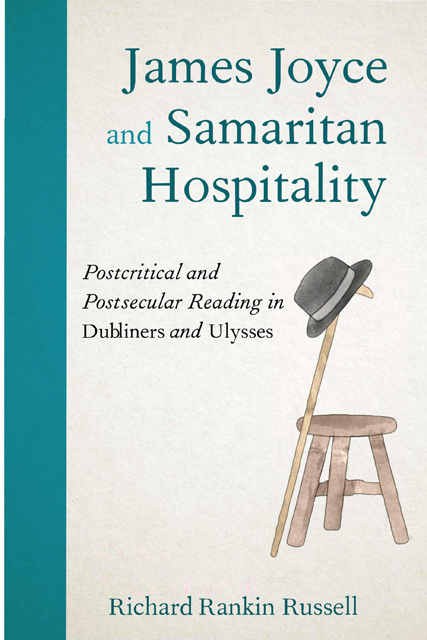Book contents
- Frontmatter
- Contents
- Preface and Acknowledgments
- List of Abbreviations
- Introduction
- 1 Haunted by Hospitality in “The Dead”
- 2 Joyce, Scripture, and Autobiographical Rescue Narratives
- 3 Rewriting the Good Samaritan Parable: The Fictional Rescue Narratives of “Grace” and “Circe”
- 4 Bloom as Stranger and Samaritan in “Cyclops,” “Oxen of the Sun,” and “Circe”
- 5 “In orthodox Samaritan fashion”: The Parabolic Encounter between Stephen and Bloom in “Eumaeus”
- 6 Home to “Ithaca” and “Penelope”: Bloom’s Hospitality and Stephen and Molly’s Reactions
- 7 Enfleshed Ethics and the Responsibility of the Reader in the Good Samaritan Parable and the “Nostos” of Ulysses
- Coda: “Go thou and do likewise”: Postcritical and Postsecular Reading through a Joycean Hermeneutics of Hospitality
- Works Cited
- Index
2 - Joyce, Scripture, and Autobiographical Rescue Narratives
Published online by Cambridge University Press: 25 April 2023
- Frontmatter
- Contents
- Preface and Acknowledgments
- List of Abbreviations
- Introduction
- 1 Haunted by Hospitality in “The Dead”
- 2 Joyce, Scripture, and Autobiographical Rescue Narratives
- 3 Rewriting the Good Samaritan Parable: The Fictional Rescue Narratives of “Grace” and “Circe”
- 4 Bloom as Stranger and Samaritan in “Cyclops,” “Oxen of the Sun,” and “Circe”
- 5 “In orthodox Samaritan fashion”: The Parabolic Encounter between Stephen and Bloom in “Eumaeus”
- 6 Home to “Ithaca” and “Penelope”: Bloom’s Hospitality and Stephen and Molly’s Reactions
- 7 Enfleshed Ethics and the Responsibility of the Reader in the Good Samaritan Parable and the “Nostos” of Ulysses
- Coda: “Go thou and do likewise”: Postcritical and Postsecular Reading through a Joycean Hermeneutics of Hospitality
- Works Cited
- Index
Summary
“You should approach Joyce,” said William Faulkner, “as a preacher approaches the Old Testament—with faith.”
Qtd. in Declan Kiberd, Ulysses and Us, 312[T]he Bible plays a distinctive role in the world of Ulysses that sets it apart from the brawling, untidy democracy of quotations in which it often appears to participate as no more than an equal partner with a welter of uncanonical texts, high and low.
Robert Alter, Canon and Creativity, 158In this chapter, I first argue that Joyce’s early turn to Scripture and scriptural narratives, and his deep familiarity with them, particularly the Gospel of Luke and his parables of the humanized Jesus, is grounded in a hospitality ethic that indelibly marked his great epic. I conclude with a brief assessment of two primary inspirations for the novel—Joyce’s putative “rescue” by Alfred H. Hunter from his beating in Dublin in 1904, and Joyce’s mugging and possible rescue in Rome in 1907—suggesting that these incidents enabled Joyce to read himself into the Good Samaritan parable and see in it profound fictional possibilities.
“Preparatory to anything else”: Joyce’s Interest in Scripture As D. H. Lawrence slightingly acknowledged about Ulysses in his letter of August 15, 1928 to Aldous and Maria Huxley, Joyce thoroughly incorporated passages from Scripture in the novel to the extent, Lawrence believed, that it was merely an assemblage of quotations from other sources: “Nothing but old fags and cabbage-stumps of quotations from the Bible and all the rest…” Lawrence’s remark reveals the extent to which Joyce’s contemporaries recognized the novel’s immersion in Scripture, although later critics have by and large tended to downplay the role of scriptural narratives as intertexts in Ulysses. Critics who have closely examined the scriptural underpinnings of the novel, however, have apprehended their variety and pervasiveness, and furthermore, how biblical narratives enable Joyce to achieve his moral vision. For instance, Robert Alter, a leading expert on the use of Scripture in literary narratives, has argued that “[i]n the extraordinarily supple and varied uses to which the Bible is put in Ulysses, it is converted into a secular literary text, but perhaps not entirely secular, after all, because it is reasserted as a source of value and vision.
- Type
- Chapter
- Information
- James Joyce and Samaritan HospitalityPostcritical and Postsecular Reading in Dubliners and Ulysses, pp. 42 - 62Publisher: Edinburgh University PressPrint publication year: 2023



